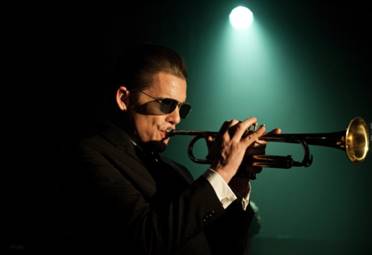 Writer/Director Roger Budreau’s late in life portrait of jazz trumpet legend Chet Baker, Born To Be Blue, is much more than a biopic. Rooted in Ethan Hawke’s outstanding portrayal of Baker, it’s an exploration of the boundless obsession and tendency towards addiction that can- and often does- come hand in hand with brilliance.
Writer/Director Roger Budreau’s late in life portrait of jazz trumpet legend Chet Baker, Born To Be Blue, is much more than a biopic. Rooted in Ethan Hawke’s outstanding portrayal of Baker, it’s an exploration of the boundless obsession and tendency towards addiction that can- and often does- come hand in hand with brilliance.
The film swings into motion in 1966, when Baker is bailed out of an Italian jail by an opportunistic movie producer, who brings him to Hollywood to star in the movie of his life to date, a story which naturally includes the night that he got hooked on heroin– a habit that dogged the musician for the rest of his life.
If the film is to be believed, Baker first shot up after his debut performance at jazz mecca Birdland in New York City. Desperate to win the approval of Miles Davis and gain entry into the upper social echelons of a largely black jazz scene, he’s crushed when Davis tells him that he doesn’t have the chops; head back to the beach, kid. In an ingenious bit of filmcraft, Budreau shoots the movie scenes in black and white, switching to color when the film’s fictional cameras stop rolling. This early on film-within-a-film vignette of Baker’s Birdland nightmare proves to be a perfect storm of problems that hang ominously over his head throughout both the course of the film and Baker’s life at large: infidelity, heroin addiction and the pursuit of acceptance from Miles and Dizzy Gillespie.
Our swift introduction to Baker’s demons make it all the more poignant when we meet Jane (played with strength and elegance by Carmen Ejogo), a talented young actress hoping to make her big break, who remarks between takes, “I need to know more than just, I’m playing the women of Chet Baker.” A meta-commentary on her role in Born To Be Blue, she adds, “I don’t understand why these women stay with you.” Baker accepts that as a challenge, of course, and insists on taking her out. But the date is cut short when Baker is attacked by a former drug dealer.
After the incident leaves him hospitalized and unable to play the trumpet, his movie is shelved indefinitely, leaving Baker with few to no prospects. But Jane remains by his side, nursing him back to health and encouraging him in a seemingly impossible comeback as he attempts to relearn the trumpet with false teeth. Living in her RV on the California coastline, they build a life for themselves, Baker slowly redeveloping his skills and Jane pursuing her acting career.
Budreau calls this film an “anti-biopic,” and indeed, the movie is more memoir then biography– a fantastical blending of fact and fiction that neither valorizes or condemns Baker, but rather paints an honest, realistically surrealistic portrait of a man who is capable of both personal and wide-reaching destruction as well as superhuman dedication and persistence.
With a pencil mustache, slicked back hair and airy tenor, Hawke is a perfect embodiment of Baker’s contradictions. He’s impetuous and childish, yet endlessly charming; he’s guileless and calculating; he’s effortlessly virtuosic- he tells Jane a story about beating out hundreds for his first gig playing with Charlie Parker – yet ruthlessly committed to his craft.
From the plot to the dialogue to the cinematography, Born To Be Blue is artistic yet accessible, possessing a frenetic, engrossing energy not unlike the genre it uncovers. Whether or not you walk into the theater a jazz lover, you’re bound to walk out wanting more of it all- especially the charming, devilish genius, Chet Baker.
-Emily Gawlak



Be the first to comment!